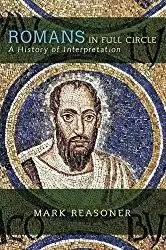

Romans in Full Circle: A History of Interpretation (Westminster Histories of Chris)
Pages
192
Publisher
Westminster John Knox
Published
1/1/2005
ISBN-13
9780664228736
The New Testament book of Romans has played an important role in the life of the church from the period of the early church and through to the present day. In this concise survey of the major theological changes associated with Pauls letter, Mark Reasoner focuses on its history and interpretation, particularly through the works of Origen, Augustine, the medieval exegetes, Luther, and Barth. In doing so, he reveals that by a circuitous route, western Christians in the 20th and 21st centuries are returning to reading Romans in ways very similar to Origens concerns in the third century. This is true particularly in regard to issues of the human will, sensitivity to Jews and Judaism, openness to the possibility of universalism, and a deconstructive reading of the obedience to government passage in Romans 13. Thus, in addition to giving a helpful overview of Romans itself, this book will help readers situate their theological questions within the 2000-year history of conversations about Pauls letter to Roman believers.
Reviews
In this engaging and well-written book, Mark Reasoner has provided for the biblical specialist and nonspecialist alike a very informative historical sketch of some of the theological disputes that the Letter to the Romans has spawned over the Christian centuries. Reasoner reminds us that we all read the Letter to the Romans with a certain bias, as through a pair of interpretive spectacles formed through two millennia of Christian theology. Thus all of us have joined the conversation in midstream. Reasoner’s insight is that in recent critical exegesis the interpretation of Romans is coming back full circle to that of the early patristic era, especially to that of Origen. To show this Reasoner chooses twelve different “loci” or texts of Romans that have become the centers of major controversies among theologians and other Christian leaders through the centuries. In a chapter for each locus Reasoner presents the thought of a selection of interpreters, always starting with Origen and Augustine. Medieval thought is usually represented by Abelard and Aquinas, while Luther and Erasmus (sometimes Calvin) show Reformation positions. The “neo-orthodox” interpretation of Karl Barth is always given, and the “post-Barthians” consulted are usually N. T. Wright and Katherine Grieb, along with the “New Perspective,” most often that of J. D. G. Dunn. I will have more to say about Reasoner’s selection of these commentators in the conclusion.
[Full Review]
